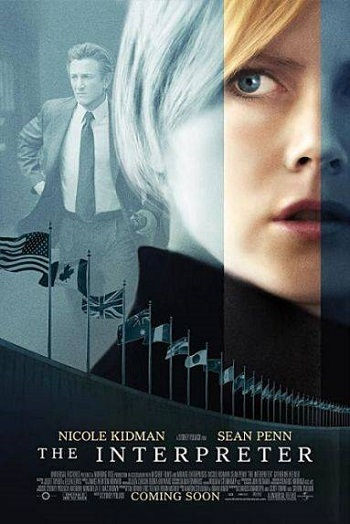The Interpreter (A PopEntertainment.com Movie Review)
- PopEntertainment

- Apr 17, 2005
- 5 min read
Updated: Aug 9, 2024

The Interpreter
THE INTERPRETER (2005)
Starring Nicole Kidman, Sean Penn, Catherine Keener, Jesper Christensen, Yvan Attal, Earl Cameron, George Harris, Michael Wright, Clyde Kusatsu, Eric Keenleyside, Hugo Speer, Maz Jobrani, Yusuf Gatewood, Curtis L’Cook, Byron Utley, Robert Clehessy, Terry Serpico and Sydney Pollack.
Screenplay by Charles Randolph, Scott Frank and Steven Zaillian.
Directed by Sydney Pollack.
Distributed by Universal Pictures. 128 minutes. Rated PG-13.
With global attention riveted to terrorism and genocide, The Interpreter is certainly a trenchant and timely film. For though the action takes place in New York City, what is really happening onscreen is being orchestrated by forces across the world, in a tiny (fictional) African nation of Matobo. (The country is undoubtedly based on Zimbabwe, where there is a famous national park called Matobo Hills.) The country is run with an iron-fist by an aging dictator named Dr. Edmund Zuwanie – a former freedom fighter who appears to have been corrupted by his power. Zuwanie insists, however, that his regime is misunderstood; he is simply fighting off two violent revolutionary factions and being forced to fight fire with fire.
The dire cheapness of life is telegraphed vividly in an early scene in which two revolutionaries are taken to a soccer stadium to find dozens of freshly killed bodies. When they leave the compound, they are ambushed by a group of little boys.
However, though the country and its problems suffuse the film, it takes place in the United States. More specifically, for a great deal of the screen time, in the United Nations building. The Interpreter is the first film to be allowed to be shot on the actual location, and it is a wonderful opportunity, because just the building and its interiors give the movie a realism and gravity that a stage set could never convey.
The story revolves around Silvia Broome (Nicole Kidman), who was born in the US but grew up in Matobo. As a child her parents and sister were killed in a mine blast, causing Silvia and her brother to become rebels for the cause of toppling Zuwanie. However, she appears to have left her rebel beliefs in the past, returning to the United States and getting a job in the bastion of diplomacy; as an interpreter in the UN. One night while returning to get some of her things from her booth, she overhears someone speaking in a dialect native to her homeland, apparently threatening the life of Zuwanie when he arrives at the UN to defend himself at an international tribunal.
When Silvia reports what she has heard, she becomes the responsibility of Tobin Keller (Sean Penn), a Secret Service agent in charge of protecting visiting foreign dignitaries. Keller is in the uncomfortable position of not exactly trusting the woman who is his only witness. Her story does not on the surface of it seem to make much sense. What are the chances that someone would plan a murder on the UN floor? And how likely would it be that the threat would be in a language that most people in the world would not know, and there would happen to be a woman who spoke the dialect to overhear the plan? An anonymous tip dredges up Broome’s rebel past, and the fact that her brother is still fighting the fight at home.
Keller, who is just weathering a tragedy in his own life, decides to trust the mysterious and obviously frightened woman. It makes sense to him when she points out that if she wanted Zuwanie dead, she would have simply never reported what she heard. Besides, as his boss (played by the film’s director, Sydney Pollack) points out, the UN has had some really bad press recently, they certainly can’t allow an assassination on the floor.
This leads to a series of crosses and double-crosses as it turns out both rebel factions have representatives in New York. And while Keller and Tobin become closer (though, to the film’s credit, they resist the typical Hollywood impulse of making the two become romantically involved) he can tell that she is hiding some vital information from him.
Director Pollack, an old pro, knows how to fashion a tense political thriller. (Just check out his mid-seventies classic The Three Days of the Condor with Robert Redford and Faye Dunaway or his version of John Grisham’s The Firm with Tom Cruise and Gene Hackman.) For an example of taut, suspenseful movie making at its best, you need go no farther than a scene where Secret Service agents follow three separate and apparently opposing parties in the revolution as they go off in different directions but somehow end up on the same public city bus.
It also helps that the film stars some of our best actors in strong performances. Penn is especially good, muzzling his occasional tendency to go over the top (he was great in Mystic River, but it wasn’t exactly a restrained performance) as a man who has been blind-sided by life and is trying to find some sanity through work. Kidman is interestingly ambiguous here; every time we think we have a handle on her character she reveals a new wrinkle. It is her best role in a few years, although her recent history of The Stepford Wives, Birth and The Human Stain isn’t exactly tough competition. Indie-movie veteran Catherine Keener is extremely good, too, though somewhat wasted in a rather blah role as Penn’s supportive partner.
The movie has some faults; in the end, it takes one or two too many plot-twists. More than one of the main characters seemingly have dramatic changes of heart. Those may be somewhat understandable after the events shown but are still against all that the people stood for. Also, more than once, the film falls back on characters having pieces of information which they probably would have had no access to (this is particularly blatant in a scene when a rebel tosses out an idea that ends up prophesying one of his enemy’s plans.).
Even with these problems, The Interpreter is a gripping drama. Pollack recognizes what so many newer directors do not understand; that bloody set pieces are not the only way to keep an audience on the edge of their seats. In a not totally subtle political point-of-view, the film contrasts the rash and swift reactions of the current United States government (as represented by Penn and his co-horts) with the more measured, thought-out, diplomatic musings of the United Nations. The Interpreter is a film which, true to its UN setting, luxuriates in the subtlety of words. What people say and the meanings behind it can cause as much pain and unrest as their actions. As Kidman’s character explains, more blood has been shed due to mere misunderstanding of other people than nearly any other cause. (4/05)
Jay S. Jacobs
Copyright ©2005 PopEntertainment.com. All rights reserved. Posted: April 17, 2005.
#YvanAttal #SeanPenn #ScottFrank #ByronUtley #HugoSpeer #StevenZaillian #GeorgeHarris #EarlCameron #MazJobrani #CurtisLCook #YusufGatewood #JaySJacobs #ClydeKusatsu #NicoleKidman #PopEntertainmentcom #theinterpreter #michaelwright #CharlesRandolph #EricKeenleyside #unitednations #RobertClehessy #TerrySerpico #TheUN #JesperChristensen #moviereview #newyork #sydneypollack #catherinekeener











Comments